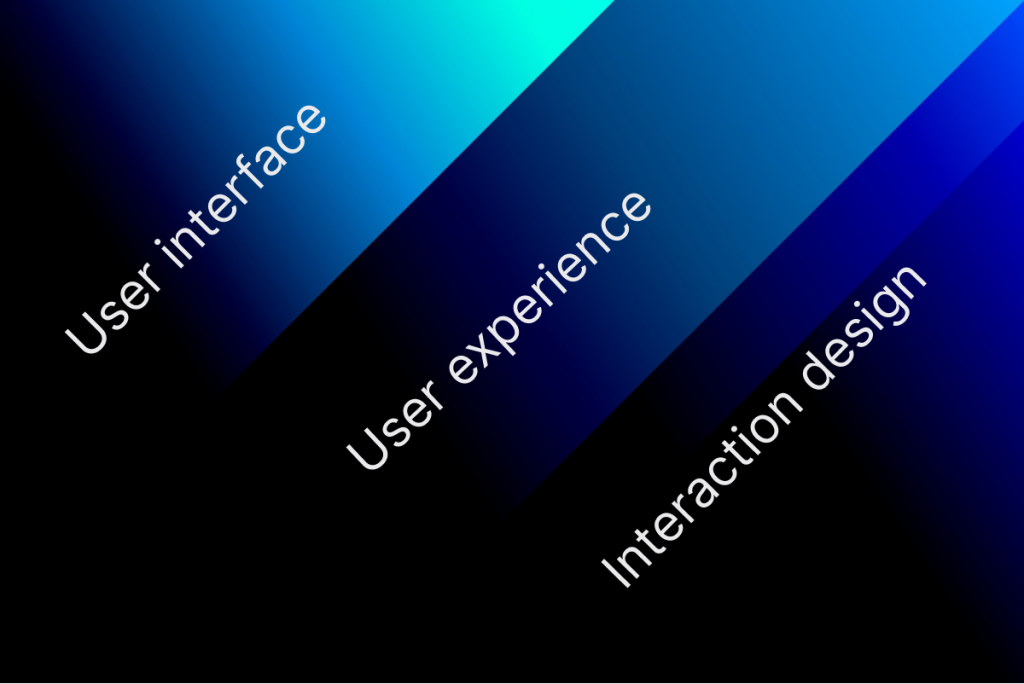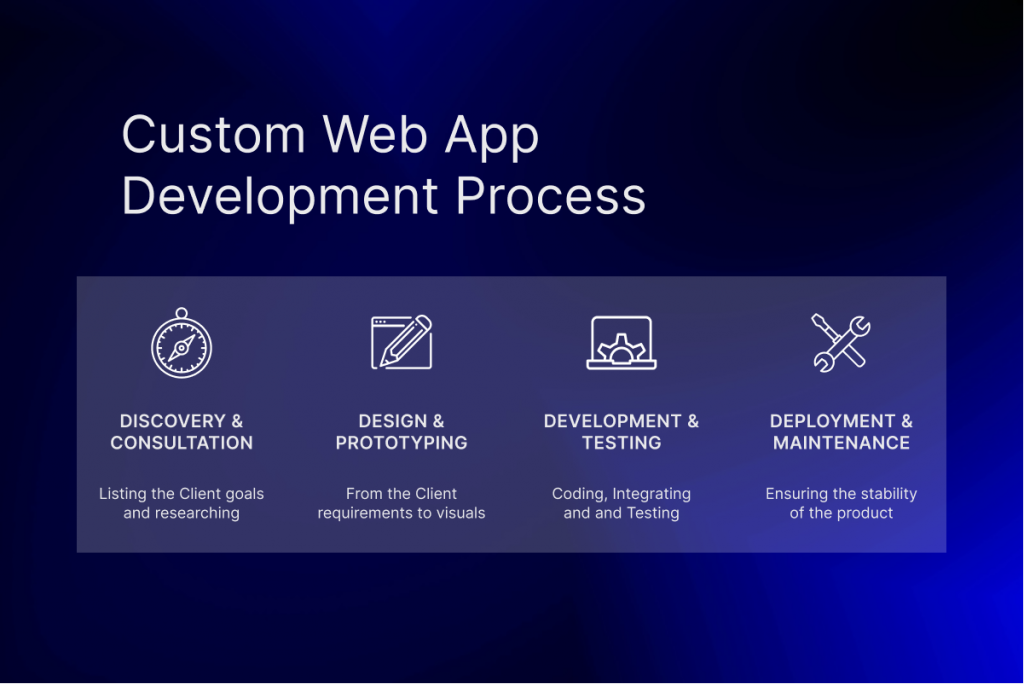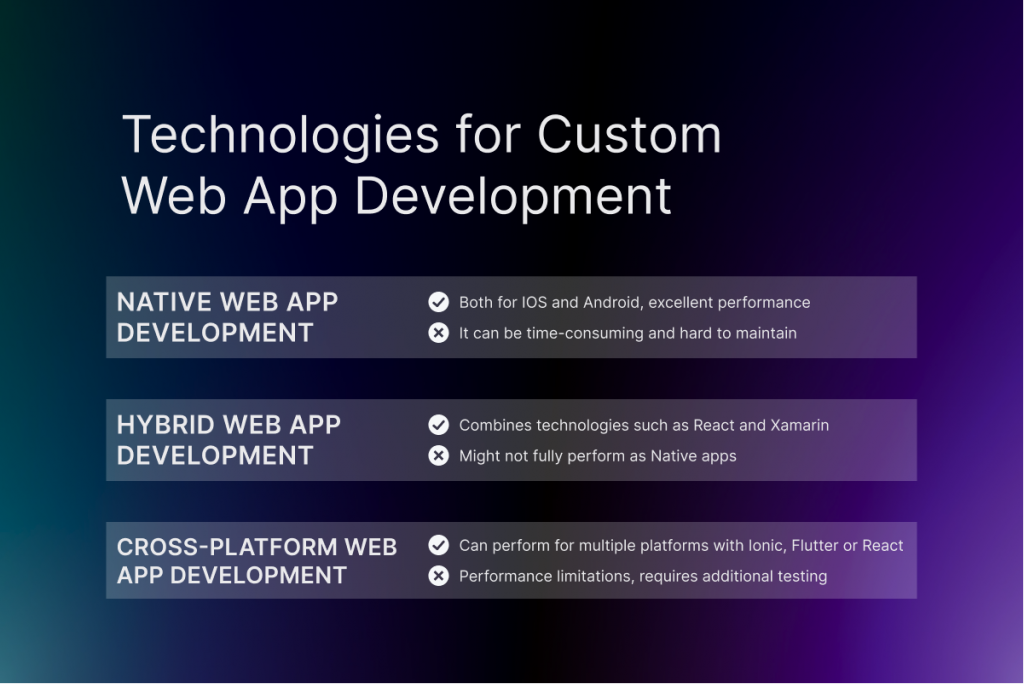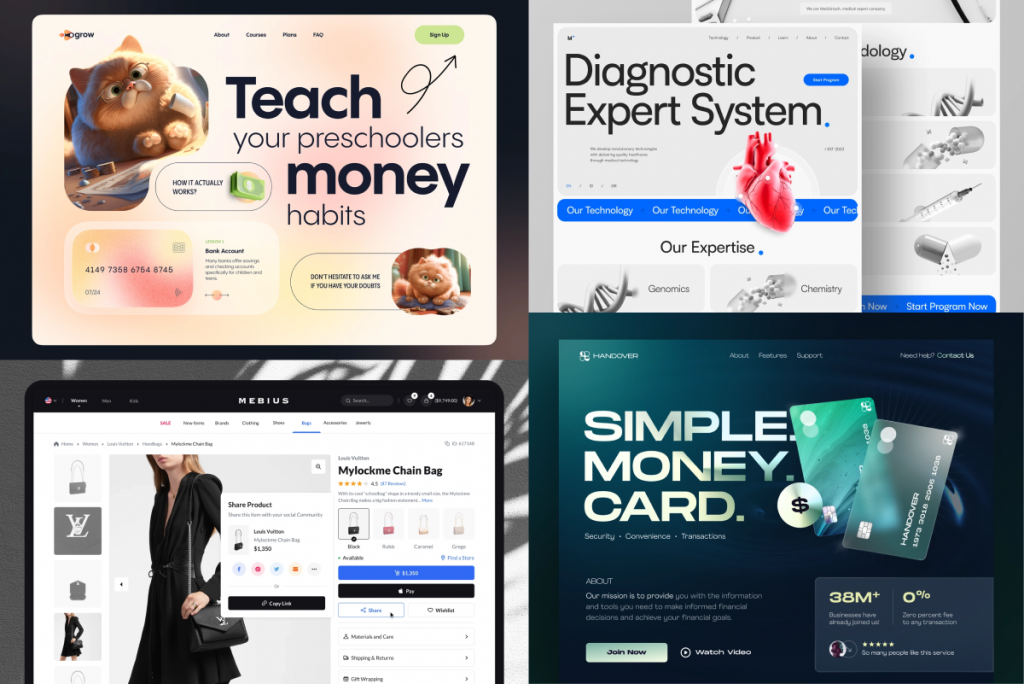Giuseppe Avagliano
May 18, 2023 • 11 min read

Custom web app design and development is the process of creating web applications tailored to meet specific business needs and requirements. Unlike off-the-shelf solutions, custom web apps are designed and built from scratch to provide a unique user experience and features that align with the goals of the business.
In today's digital age, businesses are increasingly relying on web applications to streamline their operations, improve customer engagement, and gain a competitive edge. Custom web app design and development allows businesses to create applications that are specifically tailored to their needs, ensuring that they can meet their unique requirements and goals.
Custom web apps can also provide greater scalability, flexibility, and security compared to off-the-shelf solutions, as they are built to the exact specifications of the business.
One of the primary benefits of custom web app design and development is that it provides businesses with greater control over their application's functionality and user experience. With a custom web app, businesses can add specific features and functionalities that are tailored to their unique requirements, allowing them to differentiate themselves from their competitors.
Custom web apps can also help businesses to optimize their operations by automating processes, reducing manual labor, and increasing efficiency. Finally, custom web apps provide greater security as they can be built with robust security features that are tailored to the business's needs, ensuring that sensitive information remains protected.
Custom web app design is the process of creating a unique and tailored web application that meets the specific needs and requirements of a business or organization. The design of a custom web app plays a crucial role in its success as it determines how users interact with the application, affects user engagement, and ultimately impacts the overall user experience.
The elements of custom web app design include User Interface (UI) design, User Experience (UX) design, and Interaction design. UI design is concerned with the visual appearance and layout of the web application, including color schemes, typography, and the overall look and feel of the interface. UX design focuses on the overall user experience, including usability, accessibility, and user engagement. Interaction design is concerned with the ways in which users interact with the web application, including the design of buttons, menus, and other interactive elements.
To create an effective custom web app design, it is essential to follow best practices in web design. This includes creating a clear and consistent design language, ensuring the web application is easy to navigate and use, and optimizing the design for different devices and screen sizes. A well-designed custom web app not only enhances the user experience but also helps to improve business processes, increase efficiency, and drive growth.

Custom web app development involves a comprehensive process that spans from ideation to deployment and maintenance. Here is a breakdown of the custom web app development process:
Best practices in custom web app development include adopting an Agile methodology, ensuring the web app's security, and making the web app scalable to accommodate future growth. Adopting an Agile methodology involves breaking the development process into sprints to improve efficiency and collaboration.
Ensuring the web app's security involves implementing encryption, authentication, and authorization protocols to protect user data. Finally, making the web app scalable involves designing a flexible architecture that can accommodate future growth and new features.

When it comes to custom web app development, there are several technologies available, each with its own advantages and disadvantages.
The choice of technology depends on the client's requirements, budget, and goals. Here are some of the most popular technologies used in custom web app development:
In summary, the choice of technology for custom web app development depends on various factors such as the app's complexity, budget, and target audience. A skilled web app development team can help clients choose the right technology for their needs and provide a tailored solution that meets their business goals.

When it comes to custom web app design and development, choosing the right development company can make all the difference. Here are some factors to consider when choosing a custom web app development company:
Experience and expertise: One of the most important factors to consider when choosing a custom web app development company is their experience and expertise in the field. Look for a company that has a proven track record of successful projects and has experience developing web apps similar to what you need.
Portfolio and past projects: A good custom web app development company should have a portfolio of past projects that you can review. This will give you an idea of their design style and the quality of their work. Be sure to ask for references from past clients as well, so you can get an idea of their satisfaction with the development process and the final product.
Cost and pricing: Cost is always a consideration when it comes to custom web app development. You want to make sure you're getting a fair price for the development work, but don't let cost be the only factor in your decision-making process. Remember, you often get what you pay for, so it's important to find a company that offers a good balance of quality and affordability.
Communication and support: Effective communication is crucial throughout the custom web app development process. Look for a company that offers clear communication channels and is responsive to your questions and concerns. Also, make sure they offer ongoing support for your web app after it's deployed.
References and testimonials: Finally, be sure to ask for references and testimonials from past clients. This will give you a good idea of their experience working with the development company and the quality of the final product. A good development company should have no problem providing this information.

Custom web app development services offer a range of benefits for businesses of all sizes and industries. By developing a custom web app, businesses can personalize and customize their digital presence to better suit their specific needs and goals. Here are some of the key benefits of custom web app development services:
In summary, custom web app development services offer businesses the opportunity to create digital products that are aligned with their unique needs and goals. By enhancing user experience, providing increased functionality, and gaining a competitive advantage, businesses can leverage custom web apps to drive growth and success.

Custom web app development has been successfully implemented in various industries, including education, banking and finance, retail, and healthcare. Case studies of custom web app development services showcase the benefits and impact of custom web app development in these industries.
In the education industry, custom web app development has been used to enhance the learning experience for students. For example, a custom web app can be developed to provide students with personalized study materials and resources. This can help students to learn at their own pace and in their preferred learning style. Additionally, custom web apps can also be used to streamline administrative tasks for educators, such as grading and attendance tracking.
In the banking and finance industry, custom web app development has been used to improve customer experience and increase efficiency. For instance, a custom web app can be developed to allow customers to easily manage their accounts, transfer funds, and access other banking services online.
This can save customers time and provide them with a more convenient banking experience. Custom web apps can also be used to automate processes, such as loan approvals and account openings, which can reduce errors and increase efficiency.

In the retail industry, custom web app development has been used to improve inventory management, customer engagement, and sales. For example, a custom web app can be developed to allow customers to easily browse products, make purchases, and track orders online. This can increase customer engagement and drive sales.
Custom web apps can also be used to streamline inventory management processes, such as tracking stock levels and orders, which can reduce waste and improve efficiency.
In the healthcare industry, custom web app development has been used to streamline patient record-keeping and appointment scheduling. For example, a custom web app can be developed to allow patients to easily book appointments, view medical records, and communicate with healthcare providers online.
This can save patients time and provide them with a more convenient healthcare experience. Custom web apps can also be used to automate administrative tasks, such as billing and claims processing, which can reduce errors and increase efficiency.
Overall, custom web app development has proven to be a valuable tool for businesses in various industries. By providing personalized solutions, improving user experience, and streamlining processes, custom web apps can help businesses achieve their goals and gain a competitive edge.
Once your custom web app has been developed, it's crucial to thoroughly test it to ensure its functionality, security, and user experience. Testing should be done at every stage of development, from the initial design and prototyping phase to the final launch. Testing should include functional testing, usability testing, performance testing, security testing, and compatibility testing.
Functional testing ensures that all features and functions of the app are working correctly. Usability testing focuses on the user experience and how easy it is for users to navigate and use the app. Performance testing tests the app's speed and responsiveness, especially under heavy loads. Security testing ensures that the app is secure and protected from potential vulnerabilities. Compatibility testing tests the app's compatibility with different devices, browsers, and operating systems.

Once the testing phase is complete, the app is ready for launch. Launching a custom web app involves several steps, including selecting a hosting platform, setting up a domain name, and deploying the app to the hosting environment. It's essential to ensure that the app is launched on a secure and reliable platform to minimize downtime and ensure optimal performance.
To launch your custom web app successfully, it's crucial to plan and prepare for its launch. This includes creating a launch plan that outlines the steps involved in the launch process and setting a launch date. You should also create a marketing plan to promote your app and generate interest and excitement around its launch.
In summary, testing and launching your custom web app are critical steps in the development process. By thoroughly testing your app and launching it on a secure and reliable platform, you can ensure that it functions correctly, is secure, and delivers an exceptional user experience.
After launching your custom web app, it's essential to maintain it to ensure it remains up-to-date, secure, and functional. Proper maintenance helps prevent downtime and increases the app's longevity, ensuring it stays relevant and useful for your business and users.
Maintenance involves various activities, such as regular updates, bug fixes, and security checks. It's crucial to have a dedicated team or service provider to handle these tasks and ensure they're done promptly and efficiently.
Updating your custom web app regularly helps add new features, improve functionality, and fix any bugs or issues. It's also essential to stay up-to-date with the latest web technologies and trends to ensure your app remains competitive and relevant.
Security is another critical aspect of maintaining your custom web app. You must regularly conduct security checks and implement the latest security measures to prevent cyber attacks and data breaches.
Finally, ensuring scalability and future-proofing is essential for maintaining your custom web app's longevity. As your business grows and evolves, your app should be able to scale with it and adapt to changing user needs and technological advancements.
In conclusion, custom web app design and development offers businesses a wide range of benefits, including personalization, enhanced user experience, and increased functionality. It is important to work with a reputable and experienced custom web app development company to ensure that the app is designed and developed to meet your specific business needs and goals.
When choosing a custom web app development company, it is essential to consider factors such as experience, expertise, portfolio, cost, communication, and references. Once your custom web app is designed and developed, it is crucial to test and launch it properly, ensuring its quality and performance.
Finally, maintaining your custom web app is critical to ensure its scalability and future-proofing. Regular updates and maintenance will ensure that your app stays up-to-date and continues to provide value to your business and customers.
In today's digital age, custom web app design and development is becoming increasingly necessary for businesses to stay competitive and meet the evolving needs of their customers. By investing in custom web app development services, businesses can enhance their online presence, streamline their operations, and drive growth and profitability.
Contact us for customer web app development services!
Giuseppe Avagliano
Giuseppe is a Marketing expert with 10 years of experience in international media companies and e-commerce. He is passionate about everything that concerns technology, ranging between advertising, smartphones, computers, Cryptos, and NFTs. For sure, there is more coffee than water in his veins but still thinks that calm is the virtue of the strong.